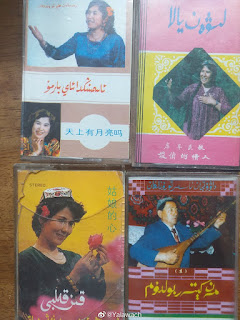The Uyghur Old Cassettes offer a captivating glimpse into the rich cultural tapestry of the Uyghur people, who primarily reside in the Uyghur Region. These cassettes represent a unique chapter in the broader culture that emerged globally during the late 1970s and 1980s.
During this period, cassette tapes became a popular medium for recording and distributing music, driven by their accessibility and affordability. This movement profoundly impacted various regions, including the Uyghur Region. It coincided with a significant change in China as the Cultural Revolution ended, and the country gradually opened up to the outside world.
Cassettes provided a vital means of sharing music, enabling a diverse range of genres, from national to electronic, to reach Uyghur audiences. This accessibility was particularly crucial in China, where political and economic constraints limited access to Western music. It empowered local artists and enthusiasts to record their music, often in home studios, and distribute it on cassette tapes, embodying a "do-it-yourself" ethos.
This cassette culture also offered a platform for Uyghur artists to create and share their work outside of the official state-sanctioned channels, allowing for a form of cultural expression that wasn't entirely controlled by the government. Notable artists like Qurban Saqi, Ablikim Yangaq, and Tarim Logey emerged from this movement, impacting the country's music scene and influencing future musicians.
The Uyghur Old Cassettes are a treasure trove of recordings capturing various musical styles and ideas. They feature performances on instruments like the dutar, satar, ghijak, and dap, which hold significant cultural significance in Uyghur musical traditions. These recordings, sung in Uyghur, offer a valuable glimpse into the musical heritage of the Uyghur people.
Despite these recordings' muffled and slightly distorted quality, they bear an authenticity that reflects the conditions and technology of their time. Preserving and appreciating these cassettes is essential in safeguarding the cultural legacy of the Uyghur people, especially in light of the challenges and controversies surrounding their cultural preservation.
References
Byler, D. (2014). "Spoken Word Recordings and the Uyghur Soundscape." [Online] Available at: https://livingotherwise.com/2014/05/17/spoken-word-recordings-and-the-uyghur-soundscape
Harris, R. (2005) 'Reggae on the Silk Road: The Globalization of Uyghur Pop', The China Quarterly, No. 183, Culture in the Contemporary PRC, pp. 627-643.
Harris, R. (2003). "Cassettes, Bazaars, and Saving the Nation: The Uyghur Music Industry in Xinjiang, China." In Craig, T., & King, R. (Eds.), Global Goes Local. Honolulu: University of Hawaii Press. ISBN: 0-8248-2611-6.
Zunun, Memet T. (2019) The Encyclopedia of Uyghur Tradition and Social Customs. London: Uyghur Language Study.
Zunun, Memet T., used the pseudonym "Yalawach," on Weibo before he was restricted.
















Comments
Post a Comment